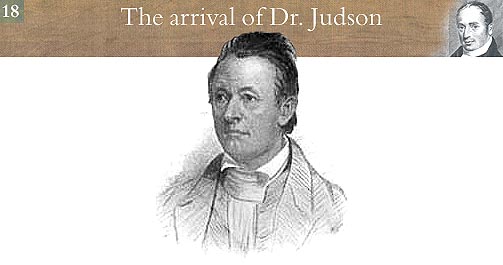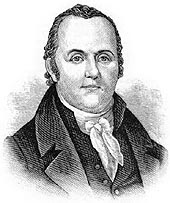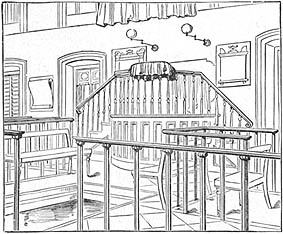

Adoniram Judson (1788-1850). Courtesy 'The Centre for the Study of the Life and Work of William Carey D.D., 1761 - 1834.'
Five years earlier, at the beginning of 1807, Mr. Mardon and Mr. Chater had sailed for Rangoon to make enquiries about the practicalities of establishing a Mission in Burma. They returned to Serampore to report that the European traders and the Government officials they met were favourable to the idea.
Mardon was unwilling to return to Rangoon as he was indisposed to learning a second language, and the prospect of breaking new ground in a foreign country was too daunting. Ward suggested they spend 15 days seeking divine guidance as to the choice of his successor. At the end of that time, Mr. Felix Carey, who was personally close to Mr. Chator, offered his services. Ward and Carey were averse to losing Felix Carey as he was familiar with the running of the Printing Office. He was capable of deputising for Ward in case of necessity, and his complete knowledge of Sanskrit and Bengali rendered him a useful assistant in the translations. Felix Carey could not be dissuaded from leaving for Burma and the majority of the missionaries were disposed to accept the offer.
A passage was procured, but the activities of French privateers in the Bay of Bengal had pushed up insurance rates to prohibitive proportions, and the passage was delayed to the end of the year. A British frigate accompanied the vessel in safety to the mouth of the Rangoon River.
It was 2 years since the agreement with Lord Minto. The period when they were 'tolerated like toads' was almost over and the period when they were 'hunted like wild beasts' was to begin again.
On 17th June, 1812, the Supreme Council passed an order for the expulsion of 2 missionaries from the country, and within a few months extended it to all missionaries who came under notice (the Serampore missionaries excepted) till the number under sentence of banishment numbered 8.
On 23rd May, Mr Mardon died of cholera at Goamulty. He was replaced by Mr. Cruz from the Bow Bazaar church. An assistant at one of the public offices in Calcutta called Mr. Thompson had joined the church and was sent to Patna. Mr. Chamberlain had to leave Agra and Mr. de Bruyn was sent to Chittagong. Mr. Chater had to leave Rangoon and was sent instead to Ceylon.
With the departure of Mr. Chater from Rangoon, Felix Carey was left without a companion, and was soon exposed to unexpected difficulties.
Disagreements had arisen between the British Government and officials of the court of the King of Ava. Captain Canning was sent with 2 vessels of war to adjust the situation. Felix Carey was called on by the Burmese Governor of Rangoon as an interpreter. He refused the request and took refuge on the British ships. A suspicion was thus raised in Burmese minds that he was an English spy. Captain Canning refused to surrender him and he remained on board for 2 months.
Negotiations were successful. The Burmese entered into a written agreement that they would not molest Felix Carey, and he returned to the town to resume his missionary labours. But, the local authorities pressed him again to act as an interpreter, and to act in that capacity in any future emergency. He referred the matter to Serampore and he was advised to put his services at the disposal of the Burmese Government.
In October 1812, Felix Carey returned to Serampore to print his version of the Gospel of St. Matthew, and also a grammar of the Burmese language he had compiled. After this work was completed, the missionaries determined to start a press in Rangoon, and when Felix Carey returned, he took a printing press.
Felix took with him a letter from the Serampore missionaries recommending him to the special protection of his majesty. 'Their beloved brethren, who from love of his majesty's subjects had voluntarily gone to place themselves under his protection, while they translated the Bible, the book of Heaven, which was received and revered in England, France, Spain, Portugal, Sweden, Denmark, Germany, Russia and America, and various other countries, as the source from whence all their knowledge of virtue and religion were drawn.' They then alluded to the press which they had sent to his dominions, stating that the laws of England were printed at such a press, so that every public officer had the same regulations to direct him in the administration of justice.
This communication created such interest in the royal palace of Ava, as to induce the King to order a printing press, with all its materials, and a complement of workmen from the Serampore missionaries. The Burmese envoy, who was about to proceed to Calcutta, was directed to take charge of it.
The press was prepared with the greatest alacrity, and the missionaries hoped that this might lead to the establishment of a mission in Ava, but the vessel in which it was embarked sank in the Rangoon river, and Felix Carey's wife and child were drowned.
Circumstances subsequently arose that prevented the press being replaced.
On the 17th June, 1812, Dr. Judson and his companion Mr. Newell, arrived in Calcutta from America. This was the first attempt by the United States to establish a mission in the East. During the previous 10 years, some of the churches in America had been gradually preparing to take a share of the missionary enterprise in the eastern hemisphere.
Captain Wickes, who had conveyed Ward, Marshman and their associates to the East in the 'Criterion' in 1799, had carried back to America a pleasing account of the missionary establishment at Serampore, and may be said to have planted the seeds of that interest in foreign missions in his native state, Pennsylvania, which has produced so luxuriant a harvest.
A correspondence was immediately opened with the Serampore missionaries by Robert Ralston, an eminent Presbyterian merchant of Philadelphia, which was continued for more than 35 years with unabated cordiality, and terminated only with the death of the last member of the Trio. To him belongs the distinction of being the first American layman who took an interest in missions to the East.
The Rev. Dr. Staughton, who was one of the founders of the Baptist Missionary Society in 1792, had emigrated to Philadelphia. He was personally acquainted with Carey and maintained a regular correspondence with him.

William Staughton (1770-1829). Courtesy 'The Centre for the Study of the Life and Work of William Carey D.D., 1761 - 1834.' The successive arrival of English Baptist missionaries on America soil, on their way to India, served to extend and deepen the interest in the cause in America. The stern opposition of the Court of Directors of the East India Company to the missionary cause had constrained 9 missionaries, between 1802 and 1812, to seek access to India by way of America. Thus the restrictions laid on English missionaries became the instrument of opening up another, and a larger supply of labourers for the missionary field.
This first direct attempt by Americans to establish a mission in the East originated in the Congregational denomination. It commenced with a small body of theological students in the theological seminary at Andover, of whom Adoniram Judson was the most ardent and distinguished. He had imbibed, what his biographer called a 'passion for missions', and he was determined to find some opportunity to proceed as a missionary to some foreign land. It was through his influence that, on the 19th June, 1810, the American Board for Foreign Missions was established at Bradford, Connecticut.
Like the Baptist Missionary Society, when formed in 1792, the American Board was ignorant of the mode of organising foreign missions, weak in funds, and unsure of their own power. They therefore dispatched Judson to England to join with the London Missionary Society upon the principle of mutual co-operation. The Society received him with cordiality, and offered to take him on their own missionary establishment, but declined to share the management of their mission with a body across the Atlantic. The American Board of Commissioners were unwilling to resign their missionaries to the patronage of another body, and shrank from the responsibility of embarking on a mission in a distant and unknown country, and of guaranteeing the support of 4 families. Their recommendation to Judson was to decline the support of the London Society, but to wait on Providence.
Dr. Judson, the first American missionary to the East, arrives in Calcutta Judson was not prepared to wait on Providence. He and his 3 companions were officially appointed missionaries to labour under the auspices of the Board in Burma. Judson embarked on the 'Caravan' on 19th February, 1812, with the same feeling of exultation as Carey had done in 1793. He arrived in Calcutta on the 17th June, 1812, and his appearance became the signal for another crusade by government against the missionary enterprise.
For several months before Judson's arrival, as Ward states to Fuller, 'the sky had been lowering'. The day after his arrival, Judson reported to the police office and stated that he and his colleague, who had passports from the Government of Massachusetts, had been sent out by a missionary society to establish a mission in some country East of Bengal. Mr. Martyn, the Senior Magistrate, reported that 'two missionaries had arrived in the 'Caravan' who pretended to be Americans by birth, though he suspected they were British subjects.' To this, Mr Dowdeswell, Secretary to Government, replied that they must prepare to return in the vessel that brought them. Judson appealed directly to Government stating that he and his associate did not intend to continue in Bengal, it was their intention to quit the country on the arrival of their 2 colleagues in the 'Harmony', and appealed for permission to wait for the vessel. Mr. Dowdeswell replied that Government could not allow them to establish themselves in any part of the Company's territories, which included Java, and all other settlements to the eastward. Judson requested permission to proceed to Mauritius, where he hoped to find a vessel bound for Rangoon. To this request Lord Minto acceded.
After a succession of discouraging incidents involving police, pilots and ship's captains, Dr. Judson proceeded to Mauritius.
During Judson's stay at Serampore, he and his companion Mr. Rice changed their religious views away from the Congregational denomination and requested to be baptised by immersion on a confession of faith. (1) They forebore to draw on the funds given them by the Congregational Board, though in a foreign land without any means of support. Their friends at Serampore withdrew all anxiety by a liberal offer of assistance until new arrangements could be made in America. The Serampore missionaries urged him to throw himself on the resources and sympathies of the Baptist denomination in America.
Judson and Rice arrived in Mauritius and Rice returned to America in the hope of rousing an interest in the denomination to which they were now connected. Judson proceeded to Madras, in the hope of finding a vessel bound for Penang. His arrival was reported to the Supreme Council in Calcutta and there was little doubt that the return post would bring an order for his deportation to England. There was no vessel at Madras bound for Penang, only an old and crazy craft on the eve of sailing for Rangoon. He arrived in Rangoon on the 13th July, 1813.
These events produced an electrifying effect in America. A feeling of attachment to missionary exertions had been gradually growing in the Baptist denomination. The names of Carey, Marshman and Ward were familiar to men in every circle, but no attempt had yet been made to form a missionary association, though the denomination was, numerically, the largest in the United States. Associations for foreign missions were formed in the principal towns, and a Central Society was established at Boston, which immediately assumed the responsibility of supporting Judson and Rice. But the diffidence which characterised the first movements of the Congregational Board applied equally to the new Baptist Board. They wished the new missionaries should be associated with the Serampore Mission and act under their directions. Fuller agreed with his friends at Serampore and suggested the Americans establish a separate organisation and take responsibility for a distinct circle of missions. Rice was requested to visit the different sections of the Union to promote the establishment of a General Association. He was received in every quarter with enthusiasm and contributions poured in with unexpected liberality, in many cases from other denominations. Delegates from the different societies met at Philadelphia on 18th May, 1814, and established the General Convention of the Baptist Denomination in the United States for Foreign Missions.
In his dealings with the King of Ava, Felix Carey had a succession of adventures and disasters which would not be out of place in a novel, and incurred the serious displeasure of his father.
Felix's actions resulted in the loss of favour with the King. He left Ava and wandered the independent provinces East of Bengal, having equally bizarre adventures. After 3 years of this wild and romantic life, he accidentally fell in with Ward in Chittagong, and was persuaded to return to usefulness at Serampore.
During 1815, Mr Hough, who was well versed in printing, was engaged by the American Board to work in Burma. He called at Serampore on his way to Rangoon and another printing press and type were prepared, to replace those previously sunk in the Rangoon River.
The Serampore missionaries sent an address to the American Convention which began, 'Our attempts in the Burmese empire have ended in the transfer of the mission to brother Judson, and those whom you may send to join him. Something, however, has been done; a mission house has been built, the language has been opened, a grammar printed, materials for a dictionary formed, a small part of the New Testament published, and a number of copies circulated.'
At a time when the Burmese missionary field appeared an irretrievable wreck, Judson and his friends moved in with speed. They brought in all that splendid energy for which the United States is known, and the Burmese mission became one of the most successful missionary enterprises.
(1) Shortly after their arrival at Serampore, on 6th September,1812 (see link), Adoniram Judson and his wife Ann (known as Nancy) were baptised by William Ward. Luther Rice was baptised by William Ward on 1st November, 1812 (see link). He wrote to his parents saying, "It was a comfortable day to my soul." Most sources suggest that the baptisms took place in Calcutta, if so, they are likely to have taken place at the Lal Bazaar Chapel.

The interior of the Lal Bazaar Chapel showing the baptistry. Courtesy 'The Centre for the Study of the Life and Work of William Carey D.D., 1761 - 1834.'